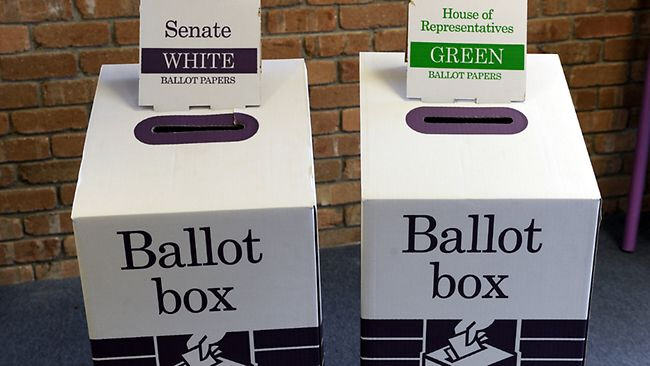Much has been said about the ‘Christian vote’, an expression often associated with those nasty-right-wing-religious-nuts imposing their morals on a secular society.
Given that 64 per cent of Australian still call themselves Christian, according to the census, it is important to clarify what the Christian vote really means.
Christians should be willing to change voting patterns after Christian reflection on particular policies. A believer who cannot imagine voting for the ‘other side’ has either determined only one party aligns with the will of God or, more likely, is actually more attached to their cultural context than to the wisdom of Scripture.

Voting patterns, of believers or otherwise, are sometimes based on little more than family heritage or geographical location. This is unreflective and sub-Christian.
Equally inadequate is voting for a candidate simply because he or she is a Christian. This is religious favouritism. Having Christians in parliament is no guarantee—or even indicator—that our nation will be marked by peace, justice, compassion and truth.
For the first 300 years of Christianity—until Emperor Constantine—believers had no representation in government. That didn’t stop them establishing hospices and food programs and experiencing spectacular missionary expansion. I wouldn’t be the only historian who doesn’t dispute the argument Christianity has often fared better without political authority.
That said, to deny Christians a voice in contemporary society would be ridiculous. Despite low weekly church attendance, Australia has high rates of Christian belief. When asked “How important is God in your life?” (1 being not at all, and 10 being very) the most recent World Values Survey (2006) found nearly 60 per cent of Australians choose 6 or higher – and 28 per cent chose 10. Last year a Herald-Nielsen poll found about half of Australians regard themselves as Christian believers. Australia rightly has secular government but it is not a ‘secular country’.
So, what principles guide the ‘Christian vote’?
In the political realm, Christians should use whatever influence they have to contribute to others.
First and foremost, a Christian vote is a vote for others. It is basic to the Christian outlook that life is to be devoted to the good of others before ourselves. In the political realm, Christians should use whatever influence they have to contribute to others, to ‘consider others better’ than themselves.
Typically, the small business operator decides to vote for the party that promises to do more for small business. Union members vote for the party guaranteeing more power to the unions. Company managers with staffing issues tend to support the party offering the most flexible industrial relations policy. Such voting considerations are inadequate for Christians, who will endeavour to put private interests aside and seek to serve the wider community.
Secondly, the moral health of our community will provide another motivation for the Christian vote. This is a tricky one to explain (to believers as well as non-believers). The church has no right to try and impose a Christian moral code on the country. That said, Christians believe a society’s health depends (in part) on living as God designed. You can’t blame believers for pondering which party or policies will promote those values: justice, harmony, sexual responsibility, honesty, family and mercy.
Will Christian voters be put off by Gillard’s non-marital status? A few will be, but I suspect most are thoughtful enough not to expect a non-Christian prime minister to live by Christian ideals in every case. Gillard doesn’t pray, either, but that doesn’t disqualify her for high office. It would be different if a Prime Minister were found to be having an affair. That would deeply trouble Christians (and many others) because it would call into question the leader’s self-control, faithfulness and integrity in relationships, qualities crucial for leadership. Christians do not separate ethics from competency.
The moral concerns of Christians invite the designation ‘right-wing’ and ‘conservative’. The tag isn’t entirely inaccurate, though in other respects the Christian view will appear ‘left-wing’ and ‘liberal’. The Gospels make clear Jesus was a right-wing liberal and a left-wing conservative.
Thirdly, Christians will think of promoting the Christian message. The missionary dimension of Christianity runs deep. Is one party better for this than another? As things stand, I doubt it. I raise this purely as a hypothetical issue. One day, though, a particular policy may work against a Christian’s freedom to proclaim Christ. In that case, Christians would be sensible to vote to prevent that outcome.
A Christian vote is one sincerely motivated by a concern for the disadvantaged, be they elderly, Aboriginal and Torres Straight Islanders, unemployed, homeless or seeking asylum.
Finally, Christians will principally have in mind the poor and powerless. The mandate for this throughout Scripture is overwhelming. Voting for the underprivileged in Australian society has traditionally been seen as a vote for Labor. Others argue the most effective way of helping the poor and weak is to increase prosperity at the top so that wealth can trickle down to those who need it most. This has traditionally been put by conservatives.
I don’t make a judgment about either model, but underline that a Christian vote is one sincerely motivated by a concern for the disadvantaged, be they elderly, Aboriginal and Torres Straight Islanders, unemployed, homeless or seeking asylum.
For Christians (and, of course, for others too), the bottom line is not the bottom line. Australia is the second most developed nation in the world, according to the UN Human Development Index, and one of the most prosperous. The economic bottom line, then, is just a tool for opening up greater national goods.
Christians ought to resist the temptation to vote for the party they think will shave more off their tax bill or add a percentage point more to GDP. They should be thinking of others. Nothing else can be called a Christian vote.
Dr John Dickson is a director of the Centre for Public Christianity.
This article originally appeared in The Sydney Morning Herald.


